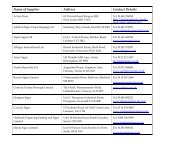titlepage/contents pg 1-16 - British Parking Association
titlepage/contents pg 1-16 - British Parking Association
titlepage/contents pg 1-16 - British Parking Association
You also want an ePaper? Increase the reach of your titles
YUMPU automatically turns print PDFs into web optimized ePapers that Google loves.
Compliance and Enforcement 151necessary that the charges andconditions be displayed so thatparkers know what to do.Where a car park is provided andregulated using a traffic order,the Local Authority is precludedby the scope of the Act fromusing other sanctions. LocalAuthorities may, however, alsooperate car parks without anorder, normally with accesscontrol where the regulation ofthe car park would depend on acontract between the user andthe operator. Car parkscontrolled by order may also useaccess control but this isrelatively uncommon.Car parks not subject toa Traffic OrderMunicipal car parks may beoperated without an order,relying instead on pay-on-footsystems. The user is requiredthen to pay an advertised sumfor the parking that they use andfailure to do so could, dependingon the circumstances, lead eitherto a civil action to recover a debt,or to a criminal offence. Therewould normally be no effectiveenforcement action possible if adriver chose to ignore someother condition associated withthe use of the car park, such asparking across two bays.Private car parks that areoperated to provide a service tothe public on a commercial basisalso rely on a contract betweenthe parker and the operator forpayment of a fee. Commercialoperators have no explicitpowers to “enforce” other than bya civil action after the event. Forthis reason most publiclyavailable privately operated carparks have attendants to controlaccess.Enforcement usingwheel clamping onprivate landThere are some private carparks, for example many railwaystation car parks, that rely on payand display with a threat of wheelclamping to deter non-payment.The use of wheel clamps inthese circumstances is a legalminefield in England and Walesand is illegal in Scotland.Generally, the use of wheelclamps is a very contentiousissue, not least because of thequality of people employed bysome clamping companies, thecircumstances of use and thequite penal sums that have beendemanded by some operatives.In an attempt to deal with someof the worst practices theGovernment included in theSecurity Industries Act, 2001(8)powers to enable the companiesoffering wheel clamping servicesto be regulated. The Act allowsfor the publication of a Code ofPractice for clamping on privateland and, following publication ofthe necessary regulations,private clampers will have to beregistered and comply with apublished code of practice.Some private operators purportto issue a civil penalty. These arewholly without legal basis andare unenforceable in any courtproceedings. They aretantamount to extortion.The complexities of clamping onprivate land add a further reasonfor keeping as much publicparking as possible within LocalAuthority control, so thatenforcement procedures aresubject to democraticaccountability.Private car parks andprivate landThe final category of car parkingwhere enforcement may berequired is a private car park orprivate land, for example anoffice car park where the carpark is available to users byinvitation only. Under thesecircumstances, anyone whoparks without prior permission ispotentially trespassing. In realitythe powers available to deal withso-called “fly parkers” are verylimited since the DVLA areunlikely to release registeredkeeper details in thesecircumstances.







